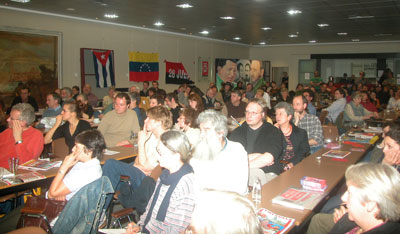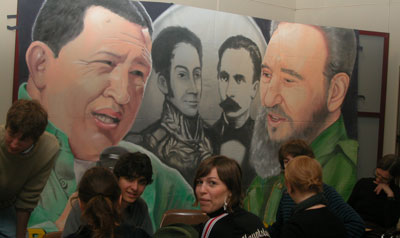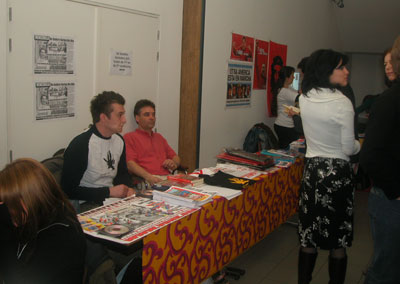Belgium: New hope for the left at day of solidarity with Venezuelan revolution
- 09 May 2006
Organising
an activity during the Easter weekend is risky business. A low
turnout is almost guaranteed. A hundred participants would have been
a great success for our solidarity initiative. In the end some 131
persons paid their entry and at least twenty others came in after
this. The Bolivarian revolution has apparently struck a chord in the
hearts of the left in Flanders!
The Hands Off Venezuela campaign took the initiative to bring together 17 different organisations including different socialist unions with the aim of organising a day of solidarity with the revolution in Venezuela. One of those unions, the “Algemene Centrale”, which organises building workers, as well as chemical and oil workers and many others, offered its premises for the event. The hall was decorated with all kinds of Bolivarian and revolutionary posters and banners. Information stalls of the local Salvador Allende Committee, a group organising poor people in Antwerp; PSC Open Huis, a left-wing peace organisation; Vrede, Initiativa Cuba Socialista, the HOV campaign and Vonk were present. The Hands Off Venezuela and Vonk stall attracted a lot of attention and collected 241.50 Euros thanks to the sale of brochures, DVD's, T-shirts, badges but also Marxist classics and the paper Vonk.
The composition of the participants was remarkably diverse: young people and retired workers, activists of the broad left movement, from the workers' movement, from the organised poor. The union that hosted our activity had sent different trade union leaders and many shop stewards from the chemical and oil refinery plants: Total, Degussa, Bayer and Agfa Gevaert. The Latin American continent was also well represented with people from Venezuela, Cuba, Bolivia, Ecuador and Chile. Some seventy people left their addresses to be informed about the activities of Hands Off Venezuela.
Inspiring documentary
One of the leaders of the hosting union, Danny Pauwels, explained why his union opened its doors for such initiatives. “The union,” he said, “should do more than just defend the workers on the floor. The union organisation has a general task of political education and also a social responsibility in regard to its members and activists.”
 Then
Nick Deschacht explained the planning of the day and introduced the
screening of the famous documentary The Revolution will not be
televised made by Kim Bartley and Donnacha O’Brian, two Irish
journalists who happened to be in the middle of the military coup
d’état in April 2002 against president Hugo Chavez. The
Wall Street Journal described Venezuela and Chavez as
“Washington’s greatest Latin American nightmare together with the
old headache of Cuba”. Possibly this was also the shortest coup
d’état in history as in 48 hours Chavez was back in power.
However, very few people drew correct conclusions from it. What
appeared to be a classical Latin American coup, differed from the
other operetta like coups in that it vanished very rapidly thanks to
the active and massive support of the overwhelming majority of the
population for Chavez. Although the sabotage of the official state
television made the broadcasting of anything impossible, and even
though Chavez’s advisers had made no call to the population,
hundreds of thousands filled the streets and forced the right-wing
coup leaders to surrender.
Then
Nick Deschacht explained the planning of the day and introduced the
screening of the famous documentary The Revolution will not be
televised made by Kim Bartley and Donnacha O’Brian, two Irish
journalists who happened to be in the middle of the military coup
d’état in April 2002 against president Hugo Chavez. The
Wall Street Journal described Venezuela and Chavez as
“Washington’s greatest Latin American nightmare together with the
old headache of Cuba”. Possibly this was also the shortest coup
d’état in history as in 48 hours Chavez was back in power.
However, very few people drew correct conclusions from it. What
appeared to be a classical Latin American coup, differed from the
other operetta like coups in that it vanished very rapidly thanks to
the active and massive support of the overwhelming majority of the
population for Chavez. Although the sabotage of the official state
television made the broadcasting of anything impossible, and even
though Chavez’s advisers had made no call to the population,
hundreds of thousands filled the streets and forced the right-wing
coup leaders to surrender.
The documentary was followed by an enthusiastic eyewitness report given by Maya Wuytack who participated in the World Youth Festival in Venezuela. Maya is the daughter of Frans Wuytack, who developed an activity as a workers' priest in the poor slums of Caracas in 1966. Maya is writing a book describing the experiences of her father in Venezuela. Her brother Fabio is also making a film on the Bolivarian revolution.
Development aid from South to North
After a short break, the new Venezuelan ambassador, Alejandro Fleming, started by thanking everybody for organising the solidarity event. “On the 11th of April a small minority revolted against the Bolivarian government. This is a minority which in the past always had power in its hands. The people succeeded in overthrowing the dictatorship and reintroducing democracy. But not just any democracy, but a participative democracy where the people exercise power themselves”.
The audience then listened to different testimonies of people who have had first hand experience of the Bolivarian revolution. The debate was led by Georges Spriet of the left-wing peace organisation, Vrede. First to speak was Wouter Van Damme of Comac. He visited Venezuela during the World Youth Festival with some 30 other youth during the summer of 2005. He started with a socio-economic description of Venezuela, the oil rich country with enormous resources, whose benefits were controlled by the private sector. Later he explained how the government of Chavez was freeing itself from its economic dependency on the USA.
 Erik Demeester outlined the aims of the
Hands Off Venezuela campaign: to seek support for the Bolivarian
revolution inside the international labour movement and to spread
accurate and correct information. He provided a lively description of
the revolutionary process as a conscious participation of the masses
in politics, through an enormous urge to organise from the bottom up
and the increasing consciousness amongst the poor, the workers and
women. On the other hand he described the attempts of the bourgeoisie
and the right wing to sabotage and destroy the economy. Chavez reacts
to this by expropriating companies closed down by their owners and by
placing them under workers' control. This process is a living
laboratory for socialist experiments, which the international labour
movement should follow closely. Erik concluded by pointing out the
importance of the evolution in the thinking of Chavez. “In 1998
Chavez toyed with the idea of organising a meeting about Tony Blair's
Third Way. On the basis of his experience, however, he realised that
there is no such thing as ‘capitalism with a human face’. Now he
says we should enter the road of socialism while studying the
classics in a critical way. Which government official nowadays dares
to talk about socialism?”
Erik Demeester outlined the aims of the
Hands Off Venezuela campaign: to seek support for the Bolivarian
revolution inside the international labour movement and to spread
accurate and correct information. He provided a lively description of
the revolutionary process as a conscious participation of the masses
in politics, through an enormous urge to organise from the bottom up
and the increasing consciousness amongst the poor, the workers and
women. On the other hand he described the attempts of the bourgeoisie
and the right wing to sabotage and destroy the economy. Chavez reacts
to this by expropriating companies closed down by their owners and by
placing them under workers' control. This process is a living
laboratory for socialist experiments, which the international labour
movement should follow closely. Erik concluded by pointing out the
importance of the evolution in the thinking of Chavez. “In 1998
Chavez toyed with the idea of organising a meeting about Tony Blair's
Third Way. On the basis of his experience, however, he realised that
there is no such thing as ‘capitalism with a human face’. Now he
says we should enter the road of socialism while studying the
classics in a critical way. Which government official nowadays dares
to talk about socialism?”
Xavier Declerq, General Secretary of Oxfam Solidariteit, and Francine Mestrum of ATTAC took part in the World Social Forum that took place in Caracas January 2006. They clearly came back full of inspiration. Xavier was asked to give some more explanation about the relationship between Venezuela and Cuba. He explained how since the start of the Bolivarian revolution both countries have forged strong links, both economically and in terms of solidarity. He also had a question about this for the Venezuelan ambassador, who gave a very interesting reply. According to Alejandro Fleming we cannot approach the collaboration between Venezuela and Cuba from a purely economic point of view. He gave the example of “mision Milagro”, a government backed program in which people with eye problems can be treated in Cuban hospitals, allowing them to see better again. “So the economic integration is in favour of the people.” Then he pointed out that Venezuela is breaking with a lot of schemes, for example with representative democracy. “In Venezuela we go a step further with participatory democracy in which the people participate in politics much more actively. Also the socialism we are proposing breaks with the old schemes. It is the socialism of the 21st century. We do not want to repeat the mistakes of the past. You have to read the classics and draw lessons from the past. We do not want to impose a model.”
Finally Francine Mestrum gave a gripping report about the first achievements of the Bolivarian revolution: illiteracy has disappeared in a few years, everywhere in the poor neighbourhoods medical care is provided for in collaboration with Cuban doctors. According to Francine, Venezuela proves that alternative policies are possible. “I think that message is the most important.” She referred to the so-called Millennium Goals with which the United Nations want to halve poverty by the year 2015. It is clear already they won't achieve this goal “while the Millennium Goals are very modest in comparison with the achievements in Venezuela in just a few years time!” She explained that the Venezuelan government realises that all kinds of social needs like education, healthcare, good water supplies, etc., cannot be separated from each other. What is the point of getting a good education if you have got no potable water? Besides, Chavez also links social development to economical development, for instance by giving land to the poor peasants. By way of conclusions Francine wanted to emphasize that Chavez has done something very important with the anti-globalisation movement: he has politicised it. “And I can only hope this will continue!” The applause showed that the audience was in full agreement.
From the floor there were some interesting contributions. Erik De Bruyn pointed out that we can see development aid from south to north. Venezuela gives us hope and provides us with socialist experiments. Somebody posed the question of how we can avoid a defeat like the Sandinistas in Nicaragua. The panel answered from different angles. Erik Demeester concluded that the Trojan Horse in particular needs to be removed: the capitalist state apparatus and the private ownership of the industry, through which the capitalists can continually boycott the economy. In the end Wim Benda appealed to unite the left and the labour movement around the Bolivarian revolution. This solidarity is necessary for the self-defence of the revolution because a defeat in Venezuela would lead to demoralisation all over the world. “But also because we have to break the bank of capitalism somewhere. In Venezuela there is a chance to defeat capitalism. We have to take this opportunity with both hands!”
The Cuban ambassador, Elio Eduardo Rodríguez Perdomo, said that the future of Cuba is linked with the future of Venezuela, Latin America and the whole Third World. Solidarity with Venezuela thus means solidarity with Cuba.
In his farewell speech Gust Haverbeke, regional secretary of ACOD Limburg [the socialist trade union], dealt with the importance of Venezuela for the Belgian trade union movement. He regrets that in the trade union too many people have to fall back on corporatism and refuse to look further than their trade unions. This is in sharp contrast with the activists. “When you explain that stress at work, reorganisations, etc., are caused by globalisation, people start to show solidarity and you will see them on demonstrations.” The fact that the Head Office of Antwerpen-Waasland supports the day of solidarity with Venezuela, gives Gust hope that there is room for more of these initiatives in the whole ABVV. He explained that ACOD Limburg had already elected Chavez as honorary president. For him “the trade unions have to promote the Bolivarian revolution. In the south there are people who want to break with imperialism and capitalism. That gives me hope and as a trade union we have to support this!”
April 2006
See more pictures here.

 Please help build the campaign by
Please help build the campaign by